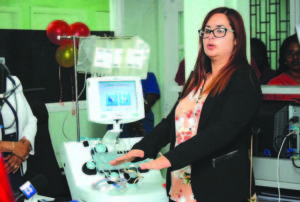
With the aim of boosting the service capacity at the National Blood Transfusion Service (NBTS) Centre, the Public Health Ministry on Tuesday commissioned a Trima Accel-Automated Blood Collection System, known as Apheresis Machine.
This is a device which receives blood removed from a patient or donor’s body and separates it into its various components: plasma, platelets, white blood cells and red blood cells.
The Apheresis Machine, which is the first of its kind in Guyana, is expected to improve the efficiency of emergency blood transfusions by providing specific components. It was acquired at the cost of US$94,000 ($19.4 million) from ISLA LAB, a Puerto Rican-based laboratory.
The commissioning of the machine was done by Public Health Ministers Volda Lawrence and Dr Karen Cummings at the Blood Transfusion Services located in the GPHC compound.
Explaining how the machine works, Director of the NBTS, Dr Pedro Lewis, noted that patients are usually in need of a blood component known as platelets but they are unable to obtain the required amount from the current process being used.
Lewis outlined that with the current process they cannot raise the amount of platelets obtained from one donor and as such, four donations of blood are needed in order to the meet the platelet count of an adult.
However, he noted that with Apheresis Machine, the blood bank will now be able to break down the donation from one person, producing four to six times the number of platelets that would usually be obtained from one donor’s blood.
This, he noted, will be a much more efficient option rather than having to go to the relatives of patients, who are in need of blood, which can be time consuming.
“So it’s easier (using the Apheresis Machine) because if a doctor orders eight platelets, you could get it from one donor,” Dr Lewis explained.
In order to ensure that staffers at the NBTS get optimum use of the machine, they are being trained by professionals from Puerto Rico. In fact, one of trainers, Lizmariel Vega, who is a Product Specialist, added that the blood transfusion process using the Apheresis Machine is not significantly faster but will also be safe for both patients and donors.
The Apheresis Machine has a lifespan of five years and will be serviced every six months by the makers.



